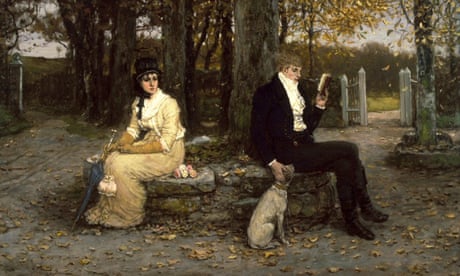I think it’s very sensitive of you to see the footprints your mother’s school treatment might have left on her self-esteem.’ Painting – Vittorio Alfieri and the Countess of Albany Luisa Stolberg, 1796

My mother has always doubted herself, especially her intelligence. She struggled a lot in school academically and this affected her self-esteem her whole life, namely by feeling “stupid”. She went to school in the 1950s and 60s and, from the way she describes it, she didn’t get a lot of help or encouragement from her teachers or family. She particularly struggles with reading and writing, which makes her avoid both of them as much as possible.
I’ve never known exactly what to think about all this – she was just my mum. But it’s only recently that I thought maybe she has a learning disability, perhaps dyslexia. A part of me thinks that if she was aware of this, knowing it is something that millions of others have and can be worked with, it might improve her sense of herself. But what if this raises a sense of regret for her (“If only I knew this 50 years ago … ”)? Should I let things be or tell her?
Karin says: Getting involved with someone else’s mental life is a tricky thing. On the one hand, a diagnosis can be profoundly emancipatory – it can help us understand things that have been alienating or frustrating. Getting proper help as an adult can feel like realising there were headlights when you’d been driving in the dark – oh, this is how it’s meant to be?!
On the other hand, loved ones just aren’t in a position to diagnose each other, and what’s intended as a helpful suggestion can easily sound like an insulting barb.
I think it’s very sensitive of you to see the footprints your mother’s school treatment might have left on her self-esteem: the punishments and labels of classrooms can long outlive the people who doled them out. But neither you or I are in a position to speculate as to whether she has a learning disability – we can only wonder about whether it would be useful to be professionally assessed. Especially if her history is marred by people treating her as foolish, it might be more helpful to think about how to help her take control of her life than to how to float the idea of a particular diagnosis, fully formed.
One problem with asking someone if they’d benefit from professional assessment is it requires them to imagine two surprising things at once: that there are very different kinds of mental experience, and that theirs is one that most people don’t share. Each of those is difficult to bend your mind around.
Sometimes, a more helpful on-ramp can be to just start with the idea that there are different mental experiences, putting aside entirely the question of whether this applies to them. After all, it’s often only once we’ve learned what a particular experience is that we’re able to wonder whether it explains anything about us. I remember being with a friend never treated for anxiety; wait, you don’t think about death all the time?
So instead of presenting her with the idea that she might have dyslexia, which could make her feel adjudicated or exposed – her child seeing something about her before she’d had a chance to think it through herself – you could try presenting her with the idea of neurodiversity writ large, with no implied connection to her.

Perhaps you’ve been researching it, or found a great novel from the point of view of someone who thinks differently, or listened to a podcast about all the ways schools and educators help nowadays. Maybe you develop a personal interest in neurological differences and tell her what you’ve learned. Being able to share stories of different experiences might inspire her to wonder about her own, and the curiosity we develop on our own is a lot more likely to stick than the curiosity others ask us to have.
You might find, too, that opening a conversation about being dismissed throughout her life could be helpful, outside of suggesting professional help. Perhaps steady doses of her child’s esteem, sensitive attention and reinterpretation could play their own role in rebuilding the self-esteem that these academic struggles took away.
A mind is a delicate thing; other people’s doubly so, but you may find that sharing information and loving connection can help both of you understand your mother’s life a little more.
Ask us a question
Do you have a conflict, crossroads or dilemma you need help with? Karin Silvina HIebaum will help you think through life’s questions and puzzles, big and small. Questions can be anonymous.






